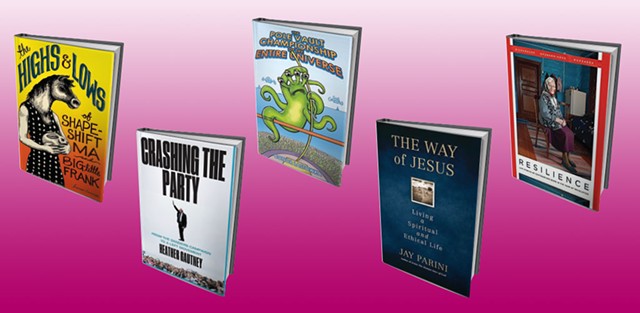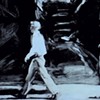click to enlarge 
Seven Days writers can't possibly read, much less review, all the books that arrive in a steady stream by post, email and, in one memorable case, a colony of cottontails. So this monthly feature is our way of introducing you to a handful of books by Vermont authors. To do that, we contextualize each book just a little and quote a single representative sentence from, yes, page 32.
Inclusion here implies neither approval nor derision on our part, but simply: Here are a bunch of books, arranged alphabetically by authors' names, that Seven Days readers might like to know about.
The Highs & Lows of Shape-Shift Ma and Big-Little Frank
Frances Cannon, Gold Wake Press, 158 pages. $15.95.
She knows the stiff linen pulled painfully tight around the mattress, the hay-tinted polyester throw blanket that inevitably slips onto the floor in the middle of the night, the pillow that collapses into two dimensions upon impact, the hum of the radiator by the window that lulls her into a daze, the forced intimacy of limited space.
Frances Cannon's memoir is as jagged as it is soft: The hybrid volume gathers straight biography, pen-and-ink illustrations and fictions into one rolling narrative that is as high, low and in between as the mother-daughter duo it depicts. Frances, as she appears in the book, is a high-strung twentysomething working through — or into — her relationship to her mother, their tumultuous history and their mutual mental illnesses, mostly of the manic sort. The exploration is indulgent, luxurious and a little bit dirty. Cannon puts it best when she writes, "Frank is on a journey to battle her shadow demons, but she also craves her own interior darkness, and relishes her own fucked-up-ed-ness. She is fascinated by illness. And Ma is more than the mother archetype of Frank's heroic journey, Ma is also the hero. They are both tricksters, both mothers, both children."
— S.W.
Crashing the Party: From the Bernie Sanders Campaign to a Progressive Movement
Heather Gautney, Verso, 208 pages. $16.95.
Bernie's antagonism to Democrats was manifest not just in rhetoric but also in legislative substance.
In her introduction to this book, Heather Gautney states that it is by no means a comprehensive overview of Sen. Bernie Sanders' (I-Vt.) 2016 presidential campaign. But, if we're going to see his run through anyone's eyes, hers are a good pair. The Ferrisburgh-based activist, writer and associate professor of sociology at Fordham University served as Sanders' campaign organizer and legislative fellow in Washington, D.C. She offers observations on subjects ranging from Sanders' appreciation for spaghetti and meatballs to reasons for the Democratic Party's struggle to define itself to the nature of Bernie's campaign as a progressive movement. The volume might be especially useful for people interested in the continuation of that trend. "For movement builders, there are many critical lessons [in Gautney's book] about striking the balance between candidates, issues and deeper organizing," writes Larry Cohen of Our Revolution in a blurb.
— S.W.
The Pole Vault Championship of the Entire Universe
Conor Lastowka, CreateSpace, 314 pages. $13 paperback, $4.99 e-book.
Death no longer appeared imminent for the family dog, but the threat of more barf loomed large, and Kara's petting was halfhearted, mostly due to the awkward posture she was maintaining in the event she needed to make a quick escape.
A senior writer-producer at RiffTrax, which creates satirical audio commentaries for movies, Burlington's Conor Lastowka shows his comedy background in this riff-heavy self-published novel. Occasionally reminiscent of Douglas Adams, it's a wild and wacky ride through American pop culture, with a hefty dose of sci-fi parody thrown in. How exactly does teenage athletic underachiever Kara Everglades get roped into a pole-vault championship held in a hideous micronation known as HAWAll (no, not Hawaii), in which her chief rival is a tentacled alien with a fixation on proving himself? How exactly do a space barge called the Stupid Butt and an evil mascot costume figure in? You'll have to read this oddball odyssey to find out.
— M.H.
The Way of Jesus: Living a Spiritual and Ethical Life
Jay Parini, Beacon Press, 208 pages. $24.95.
I believe in you, the ways you went,
your hands that lifted me along the hills,
that pointed out (in case I didn't notice)
many sudden turns I should have seen
but almost didn't.
Our page 32 lines come from Jay Parini's poem "Do Lord Remember," which appears in its entirety in this combination of memoir and spiritual guidebook. The bulk of the volume, however, is prose; the prolific Middlebury College professor has followed up his Jesus: The Human Face of God (2013) with an account of his own faith journey. Raised in the Baptist church, with a "fierce born-again" father, Parini embraced a philosophical approach to religion in college, studying other faiths for deeper insight into his own. Drawing on sources as diverse as T.S. Eliot and Taoism, he argues here against literal interpretations of the Bible and for a broader understanding he calls "Resurrection Thinking." But should Christians still go to church on Sunday? Yes, writes Parini, who uses his inclusive intellectual framework to explore and affirm the power of traditions and rituals such as rosary prayer. Religion, he suggests, is "about moving from somewhere that was uncomfortable, incomplete, toward a life-embracing fullness."
—M.H.
Resilience: Life Stories of Centenarians Born in the Year of Revolution
Paul Richardson & Nadya Grebennikova, photographer Mikhail Mordasov, Russian Life Books, 256 pages. $40.
But it is not merely the broken arm that Tatyana thinks is at the root of her mother's memory loss.
Montpelier-based Russian Life has produced more than 100 fiction and nonfiction books, maps and guides; since 1995, it has published the bimonthly Russian Life magazine. Yet, in a letter to Seven Days, publisher and author Paul Richardson called Resilience "the most important thing we have ever published." The book is the culmination of a sweeping two-year project called "The Children of 1917," for which its collaborators traveled through Russia and its former empire to find, interview and photograph their subjects. They created portraits in words and pictures of 22 Russians — nearly all women — who were born in the year of the Bolshevik Revolution and lived through a turbulent century.
The first remarkable thing is that any of the subjects survived, given the succession of wars, sieges, famines, influenza epidemics, purges and other cataclysms that wracked their homeland. In 1917, the authors note, the average life expectancy was 35 years. Resilience is about just that.
By assembling these intimate memories of "ordinary" people, the book offers a glimpse into "Russianness" and a collective history of this often-troubled nation.
— P.P.






















































